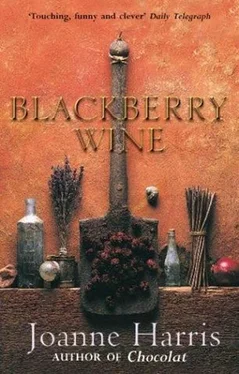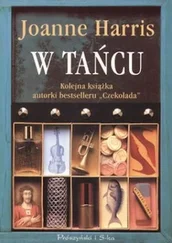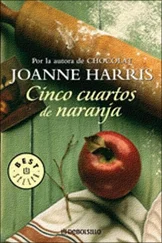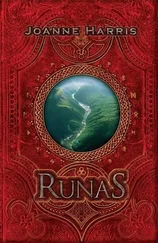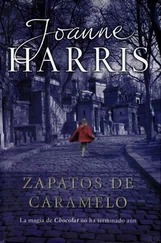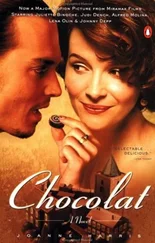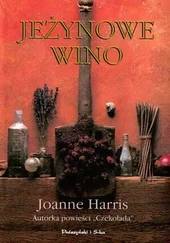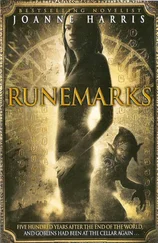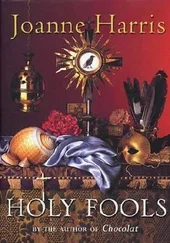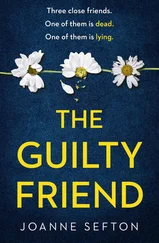‘This is ridiculous,’ Jay muttered. ‘Anyway, you’re not even here.’
‘Here? Here?’ Joe turned towards him, pushing his cap back from his face in the characteristic gesture Jay remembered. He was grinning, the way he always did when he was about to say something outrageous. ‘Who’s to say where here is, anyroad? Who’s to say you’re here?’
Jay closed his eyes. The old man’s after-image danced briefly on his retina like a moth at a window.
‘I always hated it when you talked like that,’ said Jay.
‘Like what?’
‘All that Grasshopper mystical stuff.’
Joe chuckled.
‘Philosophy of the Orient, lad. Learned it off of monks in Tibet, that time when I were on the road.’
‘You were never on the road,’ Jay said. ‘Nowhere further than the Ml, anyhow.’
He fell asleep to the sound of Joe’s laughter.
Pog Hill, Summer 1977
JOE WAS IN SPLENDID FORM FOR THE FIRST PART OF THAT SUMMER. He seemed more youthful than Jay had ever seen him, filled with ideas and projects. He worked on his allotment most days, though with more caution than of old, and they took their tea breaks in the kitchen, surrounded by tomato plants. Gilly came over every couple of days, and they would go down into the railway cutting and collect treasures in the usual way, which they would then bring up the banking to Joe’s house.
They had moved away from Monckton Town in May, Gilly explained, when a group of local kids had begun causing trouble at their previous camp.
‘Bastards,’ she said casually, dragging on the cigarette they were sharing and passing it back to Jay. ‘First it was name-calling. Big fucking deal. Then they kept banging on the doors at night, then it was stones at the windows, then fireworks under the van. Then they poisoned our old dog, and Maggie said enough was enough.’
Gilly had started at the local comprehensive that year. She got on with most people, she said, but with these kids it was different. She was casual enough about the problem, but Jay guessed it must have got pretty bad for Maggie to move the trailer so far away.
‘The worst of them – the ringleader – is a girl called Glenda,’ she told him. ‘She’s in the year above me at school. I fought her a couple of times. No-one else dares do anything to her because of her brother.’
Jay looked at her.
‘You know him,’ said Gilly, taking another drag on the cigarette. ‘That big bastard with the tattoos.’
‘Zeth.’
‘Aye. At least he’s left school now. I don’t see him much, except down by the Edge sometimes, shooting birds.’ She gave a shrug. ‘I don’t go there often,’ she added with a touch of defensiveness. ‘Not really often, anyway. I don’t like to.’
Nether Edge was theirs now, Jay gathered. A gang of six or seven, aged twelve to fifteen and led by Zeth’s sister. At weekends they would go into the town and dare each other to shoplift small items from the newsagent’s – usually sweets and cigarettes – then down to the Edge to hang out or let off fireworks. Passers-by tended to avoid them, fearing abuse or harassment. Even the usual dog-walkers avoided the place now.
The news left Jay feeling strangely bereft. After the rock fight he had remained wary of the Edge, always carrying Joe’s talisman in his pocket, always on the lookout for trouble. He avoided the canal, the ash pit and the lock, which seemed too risky now. He wasn’t going to run into Zeth if he could help it. But Gilly wasn’t afraid. Not of Zeth, or of Glenda. Her caution was for him, not for herself.
Jay felt a surge of indignation.
‘Well, I’m not going to stay away,’ he said hotly. ‘I’m not afraid of a bunch of little girls. Are you?’
‘Of course not!’ Her denial confirmed his suspicions. Jay felt a sudden impulse to prove to her that he could hold his own as well as she could – ever since the rock fight in the ash pit he had felt that, when it came to natural aggression, she had him at a disadvantage.
‘We could go tomorrow,’ he suggested. ‘Go to the ash pit and dig up some bottles.’
Gilly grinned. In the sunlight her hair glowed almost as brightly as the end of the cigarette. There was a pink stripe of sunburn over her nose. Jay felt a wave of some emotion he could not recognize wash over him, so strong that he felt slightly sick. As if something had shifted inside him, tuning into a frequency hitherto unknown and unguessed at. He felt a sudden, incomprehensible urge to touch her hair. Gilly looked at him derisively.
‘You sure you’re up for it?’ she asked. ‘You’re not chicken , are you, Jay?’ She pumped her arms and squawked, ‘ Bwrakka-bwraaak! Not even a teeny-tiny bit?’ The feeling, that moment of mysterious revelation, had passed. Gilly flicked her cigarette butt into the bushes, still grinning. Jay grabbed at her and mussed her hair to hide his confusion, until she screamed and kicked him in the shin. Normality – at least what passed for normal between them – was resumed.
That night he slept badly, lying awake in the dark thinking of Gilly’s hair – that wonderful, gaudy shade between maple leaf and carrot – and the red shale of the scree above the ash pit, and Zeth’s voice whispering I can wait and You’re dead in his ears, until at last he had to get up and take out Joe’s old red flannel talisman from its usual place in his satchel. He gripped it – worn and shiny with three years of handling – in the palm of his hand, and immediately felt better.
Scared? Of course he wasn’t.
He had magic on his side.
Lansquenet, March 1999
I’VE BECOME FOND OF JAY. WE HAVE MATURED TOGETHER, HE and I, and in many ways we are very similar. We are complex in ways which are not immediately apparent to the casual observer. The uneducated palate finds in us a brashness, a garrulousness which belies the deeper feelings. Forgive me if I become pretentious with age, but that is what solitude does to wine, and travel and rough handling have not improved me. Some things are not meant to be bottled for too long.
With Jay, of course, it was something else. With Jay it was anger.
He did not remember a time when he was not angry at someone. His parents. His school. Himself. And most of all, there was Joe. Joe, who vanished that day without warning or reason, leaving only a packet of seeds, like something out of a mad fairy tale. A bad vintage, that anger. Bad for the spirit, mine and his. The Specials sensed it, too. On the table, the four remaining bottles waited in subdued, ominous silence, their bellies filled with dark fire.
When he awoke in the morning Joe was still there. Sitting at the table with his mug of tea, elbows propped on the wood, his cap at an angle, his little half-moon reading glasses perched on the end of his nose. Dusty sunlight came through a knot-hole in the shutters and gilded one shoulder into almost-invisibility. He was made of the same airy fabric which filled his bottles; I could see right through him where the light hit him full-on, though he looked solid enough to Jay, sitting bolt upright from one dream into another.
‘Morning,’ said the old man.
‘I see what this is,’ whispered Jay hoarsely. ‘I’m going crazy.’
Joe grinned.
‘You allus were a bit daft,’ he said. ‘Fancy throwin them seeds out over the railway. You were supposed to keep em. Use em. If you ad of done, like you were meant to, then none of this would ever ave appened.’
‘What do you mean?’
Joe ignored the question.
‘You know, there’s still a good old crop of tuberosa rosifea growin under that railway bridge. Probly the only place in the world with such a good crop. You ought to go and see it some time. Make yerself some wine.’
Читать дальше
